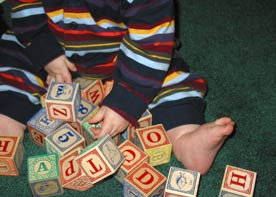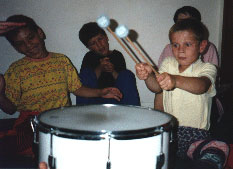What is Music Therapy?
Parents and teachers are vital in the development of most children. It is thanks to them that children learn how to eat, how to walk, how to speak and how to take care of themselves. For many children this is a straightforward learning process.
 |
For a disabled child it is a different story. Not only do many have communication difficulties and limited social skills, but they may have physical problems as well. Knowing you are different is an emotional challenge for anyone. These children are no exception. |
| "It is in playing and only in playing that the individual child or adult is able to be creative and to use the whole personality, and it is only in being creative that the individual discovers the self." (Winnicott, 1971) |  |
| Music Therapy is a broad, flexible discipline in which music is used as a creative and non-verbal medium through which the difficulties of our ‘clients’ can be addressed. It is found in hospitals, special schools, specialist centres, old people’s homes, hospices and even prisons. | |
| Those who may receive music therapy, our ‘clients’, include children or adults with learning difficulties, physical disabilities, emotional or behavioural problems. They may be the elderly, people with terminal illness, or those suffering from a variety of mental health problems. | |
Consistent music sessions offer our clients access to the important process of play and, in doing so, can:·
-
Encourage non-verbal self-expression
-
Promote the development of social skills (For example, listening, turn-taking, eye contact)
-
Develop self-awareness and interaction with peers
-
Help to establish relationships and provide a sense of belonging
-
Develop the client's potential for creative and spontaneous play